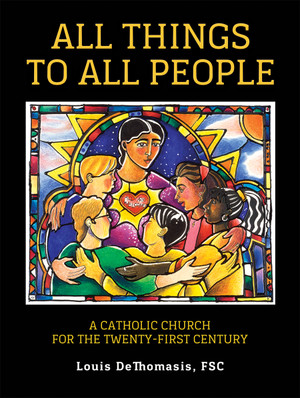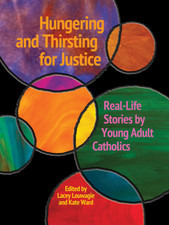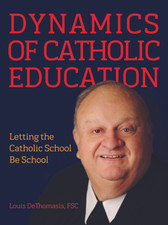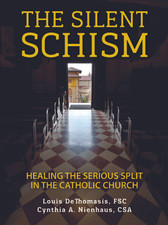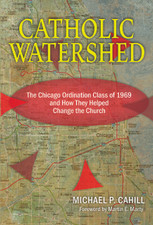The word but was used by Jesus often to clarify to his disciples his teaching was different from the conventional wisdom of the time: "But I say to you..." This was never more true when he was speaking about how the disciples (right up to today) were to act toward one another and toward those outside the group. Louis DeThomasis, a well-respected De La Salle Christian Brother and President Emeritus of St. Mary's University of Minnesota, uses this method of Jesus to look at the Catholic Church today and how it must change if it is to carry out the mission it has been given by its founder. "Even if at times the observations of this book may seem quite critical (or certainly at least impolitical or undiplomatic, given the clashes and tensions in the church today)," he insists, "I think it's about time that the People of God find the courage to speak out to all Jesus' followers and to all people of good faith, and to speak up to all institutional church leaders forcefully, although always with Christian love. Love for the church does not preclude criticism of or about the church. If we become 'one' in the church (as we pray every day in the Creed), it seems to me indisputable- whether we are conservative, moderate, or progressive by nature- that we desperately need to increase our knowledge and understanding of the gospel, the good news of Jesus Christ, in a caring, supportive, and loving Christian Spirit."
Buckle up for an old-fashioned but good-spirited Catholic brawl about the future of the Catholic Church in the twenty-first century. You may not agree with every one of Brother Louis' arguments, but they will cause you to think about what kind of Church we need and want...or, better yet, what kind of church Jesus wants us to be.
ALL THINGS TO ALL PEOPLE
A Catholic Church For The Twenty-first Century
Louis DeThomasis, FSC
A REVIEW
By Fran Salone-Pelletier
Brother Louis DeThomasis is both a creative thinker and a clever teacher. In his book, ALL THINGS TO ALL PEOPLE: A Catholic Church For The Twenty-first Century, he takes a seemingly impossible thought, being all things to all people, and weaves it into magical possibility. DeThomasis does this by using three small, simple words to unpack complexity and make it concrete. ‘But’, ‘imagine’, ‘dream’ prevail as his mantra. He invites readers to embrace these words as their own.
Chapter by chapter, the reader is led into an ever-deepening understanding of the one reality which is essential to a flourishing Church, a thriving People of God: transformation. In DeThomasis’ view, this cannot and must not be a window dressing change. It must be individual, communal, and universal or the Church will not and cannot be all things to all people.
Step by step, he engages and draws us into a recognition of an insidiously recalcitrant power structure submerged in fear of universality, diversity, and the plurality of understanding demanded when one engages with Mystery. At the same time, he connects this engagement with the persuasive, creative power of the Holy Spirit. Structures can change, must change at their core, if authenticity is to be attained, retained, and maintained. He notes this well in this quote from The Primes, “Change fixes the past. Transformation creates the future.” Perhaps DeThomasis was offering a double entendre with the word fix, using it to indicate as both mending the past and deepening adherence to its cemented status.
Unity is not something to be hoped for. It is to be worked for—a labor of love. Disagreements can empower new ways to respond, rather than evoke intransigent reaction. Hot button issues cannot remain proverbial elephants on a hierarchical dinner room table. The dynamic of certitude erodes the dynamism of hope. But, a small, powerful word, appears to be a disclaimer. Yet, it is a connector extraordinaire which allows ‘the secrets of God’s creation to be unlocked over time.”
DeThomasis does not allow laity or hierarchy the option of docile silence. Nor does he provide the option of procrastination. “Life is always urgent,” is his reminder. Transformation begins with engagement, a serious connectivity with our humanity as well as the divine spark within us. It demands imagining, envisioning an equality now sadly lacking in all institutions. There is no doubt the process will be long, challenging, and ongoing. But, as DeTomasis both warns and trusts, it is a necessary seeking in order to discover who we are always to be and become.
The discovery emerges as we dream of a church whose own dream is to follow Christ, to be alive in such a manner that a single, profound question will arise: “Where do you live?” An equally singular, profound response invites, “Come and see.”
The vision is not illusory. It is invigorating, but it calls for a growing up. It demands a radical refusal to set limits. It cannot be a string of words or ideas “made real by embellishing them with religious lace”, as DeThomasis cautions. Conversion, with its accompanying conversation, is continually calling for deep awareness of who we are, where we are, where we are going, and how we are getting there.
DeThomasis underlines the invitation to transformative growth with three words: ‘but’, ‘imagine’, ‘dream’. Come and see, but know transformative change will be lively. Come and see in order to imagine more than you see. Come and see so that the dream of inclusivity, transparency, collegiality, and accountability might be realized in a faith which is never static and always becoming. Come and see the people of God engaging in the vitality of life…a people who are willing to be all things to all people all the time. Come and see, “it’s still Christ’s church, but reimagined for today”…and will be reimagined for tomorrow.
Fran Salone-Pelletier has a Master's degree in Theology and is the author of Awakening to God: The Sunday Readings in Our Lives [a trilogy of Scriptural meditations], Lead Chaplain at Novant Health Brunswick Medical Center, Religious educator, retreat leader, lecturer and grandmother of four. She can be reached at grammistfran@gmail.com
 Loading... Please wait...
Loading... Please wait...

